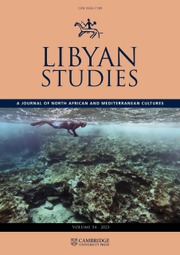No CrossRef data available.
Article contents
Born-digital sources for the history of the Libyan revolution and its aftermath
Published online by Cambridge University Press: 08 July 2020
Abstract
Archival material on the Libyan revolution and the civil war that followed is very scarce. This article discusses two born digital collections – the Libya Uprising Archive of tweets collected during the rising against Qaddafi, and the collections of asylum appeal tribunals in several English-speaking liberal democracies. Neither collection has been extensively used. It describes how the collections were formed, and the difficulties of using them and, for each, provides a short case study to illustrate these points. For the Libya Uprising Archive the case study is of tweets put out on the day Qaddafi was killed (20 October 2011), for the asylum tribunals the case study is of evidence provided by claimants about the importance or otherwise of tribalism as a factor that put individuals in danger.
المصادر الرقمية لتاريخ الثورة الليبية وتداعياتها
ريتشارد بينيل
المواد الأرشيفية للثورة الليبية والحرب الأهلية التي اعقبتها نادرة للغاية. تناقش هذه المقالة مجموعتين رقميتي المنشاء – مجموعة أرشيف التغريدات للانتفاضة الليبية التي تم جمعها خلال الانتفاضة ضد القذافي، ومجموعة محاكم الاستئناف بالعديد من الديمقراطيات (asylum appeal tribunals) الخاصة باللجوء الليبرالية الناطقة بالإنجليزية. لم يتم استخدام أي من المجموعتين على نطاق واسع . حيث تم وصف كيف تم بناء هذه المجموعات، والصعوبات في استخدامها، و تم تقدم لكل منها دراسة حالة قصيرة لتوضيح هذه النقاط. بالنسبة لأرشيف انتفاضة ليبيا، كانت دراسة الحالة عبارة عن تغريدات تم نشرها يوم مقتل القذافي (20 أكتوبر 2011)، وبالنسبة لمحاكم اللجوء، فإن دراسة الحالة هي أدلة قدمها المدعون حول أهمية، أو عدم أهمية، القبلية كعامل يضع الأفراد في خطر.
- Type
- Part 1: Research Papers
- Information
- Copyright
- Copyright © The Society for Libyan Studies 2020


